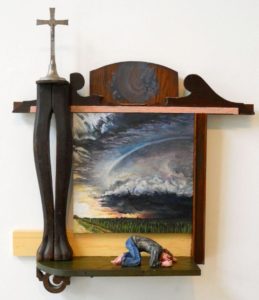
A Meditation on Psalm 130
Help, God— the bottom has fallen out of my life!
Master, hear my cry for help!
Listen hard! Open your ears! Listen to my cries for mercy.
If you, God, kept records of wrongdoings, who could stand a chance?
As it turns out, forgiveness is your habit, and that’s why you’re worshiped.
I pray to God— and wait for what he’ll say and do.
My life’s on the line before God, my Lord, waiting and watching till morning.
Waiting and watching till morning.
O Israel, wait and watch for God— with God’s arrival comes love, with God’s arrival comes redemption. No doubt about it— he’ll redeem Israel, and buy her back from captivity to sin.
“Plea” – Tim Timmerman, 2008. Oil on wood panel. Used with permission.
As I reflect on this Psalm and the lessons for the Third Sunday of Epiphany I can’t get a scene out of my mind. It is from the video series called The Chosen. (I highly recommend this series on the life of Jesus and will be happy to tell you how to get it) The scene is from the fifth chapter of Luke when Jesus calls Peter, James, and John to be his disciples. They have been fishing all night and have come up empty. But Jesus, the carpenter rabbi tells them to cast their nets one more time and the catch is so great that it threatens to swamp their boat. Peter climbs out of the boat and falls at the feet of Jesus and cries out, “Depart from me, for I am a sinful man, O Lord.” I like to think about what went into that declaration. Peter is filled with shame because he doubted Jesus. How could a carpenter succeed in fishing when he had failed so miserably. He is filled with shame because he didn’t appreciate who Jesus really was and doubted Jesus’ ability to do much of anything. He is filled with shame because his own sinful failure was staring him in the face. He was filled with shame because he was standing before someone filled with grace, and love, and power. I can relate to all of this— the powerlessness, the doubt, the sin, the shame— falling before Jesus who embodies everything I am not.
The person who wrote Psalm 130 was experiencing the same emotions. It is found in the Psalms of Ascent. These were said by pilgrims climbing to Jerusalem— ascending to the temple mount— rising to come face to face with the holy God of Israel. The closer they got to the temple, the more their own inadequacy and shame confronted them. At the same time, the closer they came to the Temple the more they reflected on God’s beauty, and love, and forgiveness. The longing to be reconciled to such a God is only matched by the dread of having our personal ugliness exposed in the presence of one who created the beauty of holiness— one who is beauty and holiness itself. We are pulled toward him and yet cry out, “Depart from me, for I am a sinner.” We “wait and watch” for his forgiveness, while we long to simply run away at the same time.
Psalm 130 is a Psalm of ascent, but it is also numbered among the Psalms of Lament. At its heart is the reality of repentance and seeking God’s forgiveness. When the psalmist prays to God, it is to ask for forgiveness and to repent and turn his heart back to the Lord— to once again love God with his whole heart, soul, and strength. This is the way of the pilgrim. This is the way of the Christian. It works every time. “If we say we have no sin, we deceive ourselves and the truth is not in us, but if we confess our sins, God who is faithful and just, will forgive us and cleanse us from all unrighteousness.” —1 John 1:8
The epiphany of the nature of Christ in the passage from Luke 5 is that Jesus does not leave Peter groveling in the sand on his face before him. He lifts him up, looks in his eyes, calls him to no longer fear, and calls him to be a disciple with the promise that he will make Peter a fisher of men. Peter is not just forgiven, he is restored and called to be a follower of Jesus, to be a disciple. How many times have we seen Jesus do this? The Samaritan Woman at the well. Mary Magdalene. The Prodigal Son. Gomer. Israel. Me. And I pray, you. You see, we are not the only ones watching and waiting to hear the words of forgiveness and calling from our heavenly Father. The Father is waiting and watching too. He longs to run to us and place a ring on our finger and a robe on our backs and proclaim, “My child, you were lost and now you are found. You were dead, and now you are alive!” He is waiting for us to turn our hearts back to him.
†Bp. Mark

